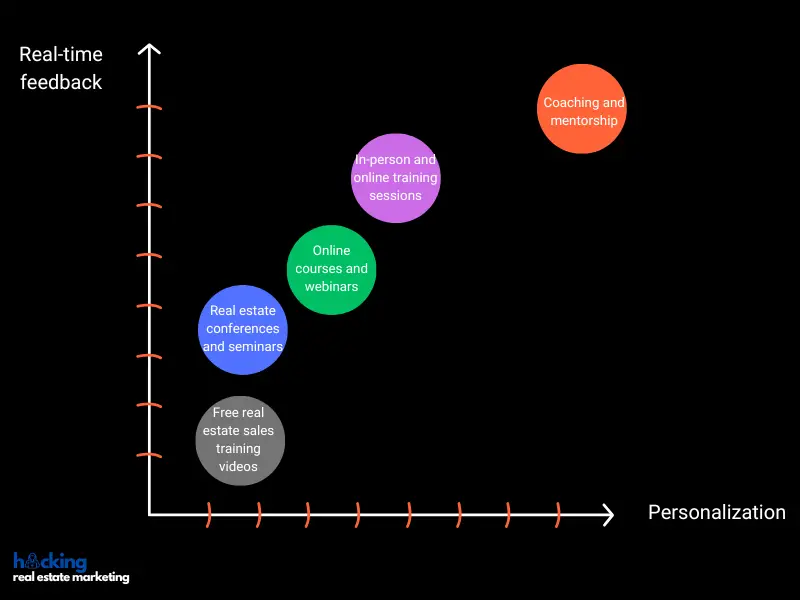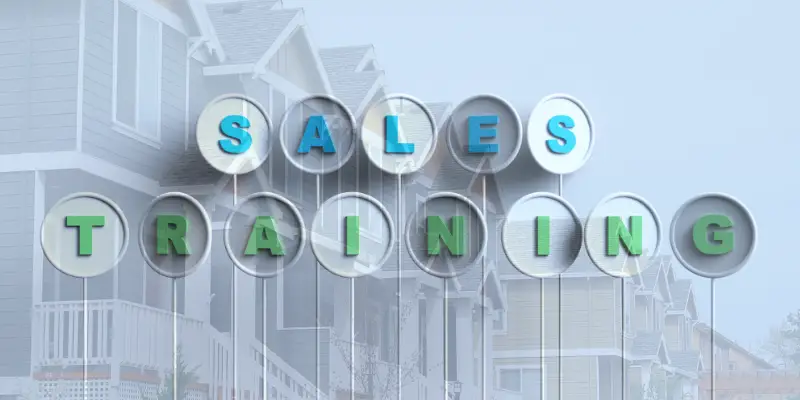Real estate sales training is essential for anyone looking to succeed in the industry and improve their persuasive power.
In this article, I will explore the benefits of real estate sales training, including statistics that show how it can help you increase your closing rates, reduce your cost per sale, and grow your business.
I will also delve into the five types of real estate sales training programs available and the five key criteria you should consider when choosing a program.
By the end, you will have all the information you need to decide which program is right for you.
Sounds interesting, then please don’t hesitate to continue reading.
Why Is Real Estate Sales Training Important? (Statistics & Benefits)
The answer to why real estate sales training is important could be given in just one sentence.
Provided it was an effective one, and you don’t forget what you learn after three months (shockingly, this happens 84% of the time, according to sales training statistics), you will increase your closing rate.
And as I have discussed several times in my articles, such as this one about real estate lead costs, a higher closing rate will reduce your cost per sale, a precursor to growing your real estate business better.
Let’s look at other (real estate ) sales training statistics that may be surprising.
Why did I put “real estate” in brackets?
I couldn’t find any specific real estate sales training statistics, but more so general sales training statistics you can easily apply to the real estate industry.
Differences are likely only some nuances.
What other sales training statistics can you apply to real estate?
Participating in a sales training program will make you 57% more effective at sales than your competition (source).
You can improve your performance by an average of 20% (source).
If you or your broker has access to a dynamic sales coaching program (it’s ongoing), you can expect to achieve 28% higher win rates (closing rates) (source).
Moreover, continuously participating in sales training programs can result in 50% higher net sales per sales rep (source).
Only a minority (17%) of companies have an effective sales training program (source), and more than half (70%) of salespeople state they haven’t received any formal training in sales.
Finally, 59% of American companies believe the biggest hurdle to effective sales training is accountability (source), in which sales reps are held accountable to apply the skills they learned.
Now let’s sum up the benefits of real estate sales training a bit in a nice overview list:
- Can increase your closing rates (28%)
- You can get an edge over your competition by being 57% more effective in sales.
- Can lead to 50% higher net sales per salesperson (e.g., real estate agent)
- You can better understand your real estate client’s wants and needs (also crucial for sales copy (my article).
- It can help you build and maintain strong relationships with your clients by learning to communicate effectively.
- It can help you establish trust and credibility with your clients (can lead to repeat business and referrals)
- Helps you adapt to changing market conditions (provided the real estate training program is up to date)
- Generally helps you improve your real estate sales skills and techniques (increased confidence in sales interactions, objection handling, dealing with rejection, etc.)
So when you look closely at the above list, all the benefits and skills you learn or should learn in real estate sales training programs are building blocks that lead to the final result of your being able to increase your closing rate and, thus, your persuasive power.
5 Key Criteria of Effective Real Estate Sales Training
Now, based on the above, especially some of the rather negative statistics, we can derive the five key criteria of effective real estate sales training.
I will later assess the different real estate sales training programs I found on the market in an overview that you can use for your decision-making.
The below criteria you can then apply to decide further on which one may be a fit for you.
Without further ado, here are the questions or criteria:
- Is it a dynamic (ongoing) real estate sales training program, which should include: personalized coaching, skill-building exercises, performance assessments, regular one-on-one coaching sessions, group training sessions, and online courses?
- Are students held accountable for applying the learned sales skills?
- Can students get real-time feedback from the trainer?
- Does it teach how to understand real estate clients’ wants and needs?
- Is it up to date and also teaches the use of technology?
- Does it just provide you with scripts, or does it teach you to increase communication and live persuasion skills?
The 5 Types of Real Estate Sales Training Programs
Before I provide you with the assessed overview of various real estate sales training programs, let’s also explore the five types available.
There are in-person training sessions, online courses and webinars, coaching and mentorship programs, industry conferences and seminars, and free real estate sales training videos.
1) In-Person and Online Training Sessions
This type of real estate sales training program is pretty popular. Usually, it involves an experienced trainer or coach and face-to-face interaction with other real estate professionals.
When the sessions are held in person, they are carried out at real estate offices, training centers, or conference facilities.
The same can be done online via, for example, a Zoom call where participants meet live with the trainer and can train role plays and other techniques.
The live situation is a good opportunity for participants to learn from the experienced trainer or coach and their peers.
For instance, the feedback is instant if you get on the hot seat and do a live role play to train a sales situation. The communication is synchronous.
2) Online Courses and Webinars
A real estate sales training program organized as an online course or webinar is a self-paced learning option.
If you have an unpredictable agenda, this might be a good option because you can learn at your own pace and from the comfort of your home.
Provided you can make it to the live webinar, you can also benefit from getting real-time feedback.
3) Coaching and Mentorship Programs
While real estate sales training organized as a coaching and mentorship program is often the most expensive type, it will likely get you faster results.
Why?
It typically involves a coach or mentor working closely with you to identify areas for improvement. Based on that, the coach can develop a personalized plan to achieve your goals.
As a matter of course, here you also get instant and real-time feedback when you train in real live-sales situations.
Depending on your preferences, this real estate sales training type can be delivered in person or online.
4) Real Estate Conferences and Seminars
While real estate conferences and seminars can give you a great motivational boost that may last 24 to 48 hours after it ends, they cannot provide you with a personalized plan and too much real-time feedback.
Many more real estate pros attend them to make economic sense for the organizers.
Thus the teaching of the trainers and keynote speaker has more of a lecture hall feeling.
However, some include smaller workshops where better teaching and training can be experienced.
These events are typically held over one or more days. You will benefit slightly more from networking opportunities than training ones.
5) Free Real Estate Sales Training Videos
I wasn’t sure to include free real estate sales training videos because learning something from them that you can translate into your individual sales situations would require extra effort.
I am not saying that the contents of these videos are bad. Not at all.
What I mean is that you won’t have the option to get any feedback from a teacher if you try to apply what you learn from them.
Also, personalization to your individual situation is non-existing.
As an extra effort, you would have to create your own training program, watch suitable videos, and organize a training situation with others to get feedback based on the contents.
Nevertheless, they can still be a good option if you have a lot of time and little money to invest in real estate sales training programs.
You can find videos about negotiation skills, communication, cold calling, etc.
Guess which of the above are the most effective real estate sale training programs?
Ordered from most effective to least effective, it’s the following:
- Coaching and mentorship programs
- In-person and online training sessions
- Online courses and webinars
- Real estate conferences and seminars (if it provides workshops)
- Free real estate sales training videos
And why did I order them that way?
You get this order when you list them according to the degree of real-time feedback you can get and how personalized they are likely.
The importance of real-time feedback for students’ successful learning is confirmed in the Journal of Educational Practice.
While this paper shows there are areas in which feedback to students of higher education can be improved, it confirms at the same time feedback practices as “important learning tools in higher education.”

Overview of 9 Real Estate Sales Training Programs (How to Choose the Right One)
This section will give you an overview of various real estate sales training programs.
The programs are categorized based on the five types of above real estate sales training programs.
| Real Estate Sales Training | Type of Real Estate Sales Training |
|---|---|
| Mike Ferry Organization | In-person training |
| Tom Ferry | Seminar |
| The Core Training, Inc. | Coaching |
| Craig Proctor Coaching | Coaching |
| Workman Success Systems | Coaching |
| The 5% Institute | Online course |
| Schneider Sales Management | Online course |
| G.U.T.S Sales | Coaching and mentorship program |
| The Brooks Group | Seminar |
Now that you have an overview to decide which program may be the right fit, you can do several things to find the right one.
First, you want to assess your goals, needs, and budget.
If you don’t have any budget, the decision is easy. It will be free real estate sales training videos.
It will also be a somewhat easy decision if you have a budget but can’t commit to a fixed schedule for live training.
Only online courses and (recorded) webinars will likely be the right fit.
Suppose you have a budget and can commit to a schedule where you can meet the trainer or coach in a live environment; then you want to analyze each of them and check which one you can afford with your budget.
You want to assess whether the ones you can afford align with the earlier criteria of effective real estate sales trainings.
This article has been reviewed by our editorial team. It has been approved for publication in accordance with our editorial policy.
- Why Real Estate Conversion Rates Are 6-Times Below Average - March 21, 2024
- How to Manage Your Apartment Advertising Campaign - February 23, 2024
- Finding Marketing Channels for Apartment Advertising - February 12, 2024

